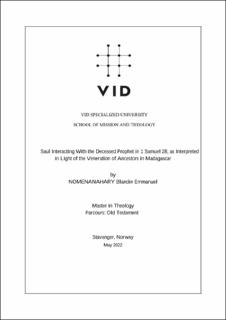Saul Interacting With the Deceased Prophet in 1 Samuel 28, as Interpreted in Light of the Veneration of Ancestors in Madagascar
Master thesis
Published version
Permanent lenke
https://hdl.handle.net/11250/3025777Utgivelsesdato
2022-05Metadata
Vis full innførselSamlinger
Sammendrag
Many Christians in the Bara area in Madagascar keep their traditional belief in
ancestors. Despite the prohibition of the Christian leaders, they keep on respecting their
hazomanga and venerating their ancestors. When I discussed with them I sometimes referred
to the famous text in 1 Samuel 28, where Israelite king Saul interacts with Samuel, a recently
deceased prophet. This text has some similarities with the veneration of ancestors
in Madagascar. This leads me to the topic: “Saul interacting with the deceased prophet Samuel
in 1 Samuel 28, as interpreted in light of the veneration of ancestors in Madagascar”.
Most Western interpreters lack background knowledge about ancestral beliefs. In
addition, colonialism led to a demonization and even destruction of African culture, including
Malagasy culture of ancestral beliefs. In this project, I use a more positive view on ancestors’
veneration, in order to bring a new light and a new understanding of the text. The purpose of
this thesis is to find a Malagasy perspective to this confusing text, trying to find the role of the
deceased Samuel in 1 Samuel 28, and the extent to which Malagasy traditional concept of
ancestors can help us understand this role.
In such interpretation, I have to discuss, first, Malagasy traditional beliefs relating to the
ancestors, and then give the analysis of the text in 1 Samuel 28 apart from the Malagasy context.
After that, I put the two into dialogue and produce the interpretation of 1 Samuel 28. This
interpretation leads me to know that the deceased Samuel in 1 Samuel 28 was a representative
of God to tell Saul the truth about his fate. The ghost of Samuel was coming up to respond
compassionately to the desperate Saul. Malagasy traditional concept of ancestors help us
understand this intermediary role to the extent that it reaffirms and deepens it.

